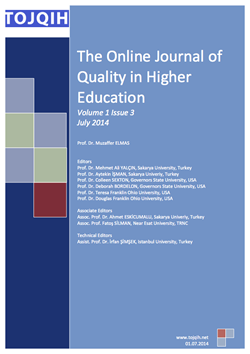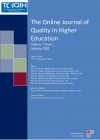TOJQIH - Volume 1 - Issue 3 - July 2014
 Investing in The Quality of Teaching in Higher Education: Why and How?
Investing in The Quality of Teaching in Higher Education: Why and How? Doris Kiendl-Wendner
Abstract: Higher education institutions (HEI) operate in a market oriented environment, since they compete for the best students and faculty. Universities have adopted various strategies to attract students and faculty. Many higher education institutions claim that they offer excellent education. However, only few institutions have so far been developing a strategy on how to prepare their teaching faculty to provide excellent teaching. This paper discusses current trends in higher education related to quality in teaching. The paper focuses on the vision and mission of HEI and their impact on career paths of faculty members. The paper shows how strategic human resource development of faculty can improve quality in teaching. The paper finally discusses the influence of didactical training as human resource development measures on faculty retention as well as student satisfaction.
 The Needs of Innovation in Mechanical Engineering Education: The Position of the Politecnico of Milano
The Needs of Innovation in Mechanical Engineering Education: The Position of the Politecnico of Milano N. Bachschmid[1], F. Cheli[1], C. Marinoni[2]
Abstract: The Department of Mechanics (DM) of the Politecnico di Milano (PdM) and the Fondazione Politecnico (FPM) have taken actively part in different initiatives related to teaching and learning quality. First step was one extensive survey of alumni in Mechanical Engineering (ME) on regional basis (Lombardy region) for defining the levels of mastery in different topics attained during the studies, compared to the levels required by the enterprises on the workplace. Regarding knowledge even a surplus of mastery furnished by university was felt by the alumni, but regarding competences and skills also gaps were found. Later the participation to the EC funded project ECCE has allowed to compare the Italian situation not only to European universities but also to the expectations of industrial stakeholders and engineering associations. Recognizing the need of changes, some members of the Pedagogic Faculty of Catholic University in Milano university have been recruited for giving courses for young professors for increasing their teaching qualities. Finally in the basic course of Applied Mechanics in the second year of the bachelor curriculum an innovating method has been introduced with the aid and support of a team of the Pedagogic Faculty. The aim of the introduced innovation was to develop some of the missing skills, and more in detail team work capability, active learning, critical thinking, project management, and presentation skills.
 Feedback in Postgraduate Supervisory Communication: An Insight From Educators
Feedback in Postgraduate Supervisory Communication: An Insight From Educators Balsam A. Mustafa[1], A. Noraziah[2], Mazlina Abdul Majid[3]
Abstract: Postgraduate supervision is one of the most complex forms of teaching in higher education. Given the high rate of failure to complete postgraduate research, the quality of the research supervision has been questioned and some determinant factors leading to this undesirable outcome have been proposed like student’s expectations of the supervisor, supervisors’ insufficient knowledge, lack of interest in students’ work, and unsatisfactory ways of delivering feedback to the students’ work. Based on our experience as research supervisors and supervisees, we consider feedback significant in creating effective working relationship between the research supervisor and supervisee and supports successful completion of the research program. Different studies have investigated to what extent the supervisor’s feedback can be more effective in improving student’s performance and the type of feedback the students need. However, few studies have looked at how and why feedback is given as a supportive activity for students’ learning and development. This paper specifically focuses on how effective working communication between the research student and the supervisor can be achieved through the way feedback is given to the supervisee and how the student receives the feedback. The study concludes that the supervisors’ ability and the supervisee’s readiness to be open to criticism to provide and receive constructive feedback in a balanced way should lead to desirable academic outcomes in the academic context.
 Integrating Weighted Learning Outcomes in Assignment Design: Does It Help Students?
Integrating Weighted Learning Outcomes in Assignment Design: Does It Help Students? Sherif Mohammed Ali El-Wageeh
Abstract: This paper discusses the importance of designing well structured assignments that are based on Intended Learning Outcomes (ILOs). Through the researcher experience as an assistant professor in the department of Architectural Engineering, it is found that the quality of students response to required assignments in the course of "Construction Management" together with their output was affected by the structure and design of the assignment itself. The researcher designed an assignment about an important topic "Trade-off in Construction Projects Management" without writing the relative weight of tested ILOs in the assignment. After receiving students output of the assignment and marking it, the researcher modified the assignment in order to incorporate certain ILOs (Knowledge and Understanding skills, subject-specific skills, intellectual skills and transferable skills) with a relative weight assigned to each. The updated assignment was re-submitted to students. While re-marking students output, it was found that the students' response and quality of their output was significantly improved.
 Importance of Identifing and Embedding Core and Entrepreneurial Skills For The Development of Tve Standarts in Higher Education
Importance of Identifing and Embedding Core and Entrepreneurial Skills For The Development of Tve Standarts in Higher Education Murat ARI[1], Hayati Mamur[2], Fatih Kokmaz[3], İsmail Topaloglu[4]
Abstract: Core and entrepreneurial skills are the basic reference in the TVE (Technical and Vocational Education) program design. On the basis of the competencies, the programs are being structured, implemented, evaluated and amended when necessary. Competency based development of TVE standards aims to train instructors in accordance with the task requirements. Sustainability of activities for the development of competencies and curricula is required for the qualitative improvement of the TVE systems. On the other hand, Competencies would function as a basis for the development of the National Qualifications System. A National Qualifications System is important for the recognition of diplomas and certificates in other countries. Competencies can be used as criteria for internal and external assessments of the institutions. In this study, suggestions, arrangements and solutions for this matter has been presented in detail for future reference in the view of Turkish Tertiary Education.
 Obstacles and Challenges of Quality Assurance in Higher Education in Libya
Obstacles and Challenges of Quality Assurance in Higher Education in Libya Eman Mohammed Almarghani
Abstract: Many studies investigated the issues associated with higher education quality in Libya. On other side, most of modern researches indicated that higher education needs to be developed meeting the objectives of such systems and attaining point of sustainability realization. This paper investigates the obstacles face the quality assurance representatives within higher education system in Libya. Furthermore, examine challenges of improving higher education outcomes quality. Inductive approach methodology was adopted to obtain results. Research found several challenges facing processes of quality assurance and accreditation starting from obstacles in public universities, quality offices difficulties, leading difficulties, organizational difficulties, learning and teaching difficulties, scientific research difficulties, community service difficulties, and obstacles in private universities. Study recommendations concentrate on the important of developing trend to reduce profound gap that make education process away from sophisticated universities, and it is time to cooperate among different destinations, starting from students through staff and parent down to labor institutions.


